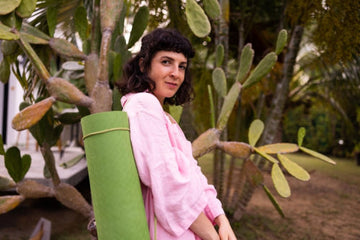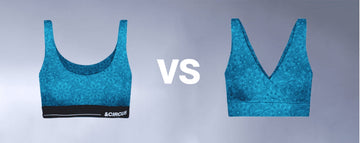Quick Listen:
In the vibrant textile hubs of Tamil Nadu, where the rhythmic clatter of looms echoes through bustling markets, a transformative movement is gaining momentum. Urban women across India from dedicated athletes and busy professionals to expectant mothers are increasingly seeking intimate and activewear that delivers exceptional comfort while prioritizing environmental stewardship. This surge in demand for sustainable options is catalyzing profound changes in the apparel sector. Organic cotton intimates from Coimbatore's workshops and bamboo-infused activewear available via Bengaluru's digital platforms exemplify how eco-conscious materials are evolving from marginal choices to mainstream essentials, redefining performance gear for women on the move.
Uncomfortable underwear shouldn't steal your confidence. At Andcircus, we craft ultra-soft, sustainable Lenzing Modal Micro® innerwear for every body, XS to 5XL. From briefs to bras, our custom packs fit you perfectly. Shop risk-free with our 100% satisfaction guarantee and embrace comfort that includes everyone. #LoveEveryBody. Shop Now!
The Growing Appeal of Eco-Friendly Fabrics Among Active Women in India's Fashion Hubs
In bustling metros and tier-1 cities such as Delhi, Maharashtra, Tamil Nadu, and Karnataka, women are seamlessly integrating fitness routines, stylish attire, and ecological awareness into their daily lives. The global athleisure market, currently valued at USD 472.71 billion in 2025, is anticipated to expand significantly to approximately USD 1,069.84 billion by 2034, achieving a compound annual growth rate of 9.50% over this period. This growth trajectory builds on the 2024 valuation of USD 431.70 billion, fueled primarily by the blurring lines between everyday clothing and athletic gear. India's urban landscapes are leading this charge, with sustainable textiles becoming increasingly popular as consumers seek products that support their dynamic routines and moral principles. Clusters in Tamil Nadu, including Coimbatore and Tiruppur, are innovating by incorporating organic cotton and bamboo composites into items like sports bras and maternity essentials. In parallel, regions like Maharashtra and Gujarat are advancing with recycled polyester and Tencel-derived materials for high-functioning undergarments that maintain strong environmental standards.
This evolution extends beyond mere appearance. Women engaged in rigorous activities be it long-distance running in Bengaluru or serene yoga sessions in Delhi require apparel that effectively manages moisture, offers flexibility, and minimizes ecological impact. Such preferences are overhauling supply chains, evidenced by the booming e-commerce interest in eco-focused intimate apparel in Delhi and Karnataka. West Bengal's adoption of plant-based dyes is curtailing the sector's chemical footprint, heralding a comprehensive move toward cleaner manufacturing processes. As environmental consciousness rises, these trends underscore a pivotal shift where sustainability enhances rather than compromises performance.
Looking deeper, the integration of eco-friendly materials is responding to broader consumer demands. For instance, the emphasis on health and wellness has amplified the appeal of fabrics like hemp and recycled nylon, which offer breathability and durability without harming the planet. In India, this is particularly evident among millennials and Gen Z, who prioritize brands that align with their values of ethical production and reduced waste.
From Looms to Lingerie: Regional Innovations
Kerala's handloom cooperatives are masterfully fusing age-old craftsmanship with contemporary sustainability, producing intimate apparel that resonates with today's eco-aware consumers. These groups, steeped in traditional methods, now craft bras and maternity garments from organic cotton and bamboo modal materials celebrated for their gentle touch and low environmental toll. Bengaluru's innovative startups are similarly harnessing these fabrics to create top-tier activewear, tailored for women navigating intense workouts and professional demands. Brands here stress supply chain openness, often displaying accreditations such as the Global Organic Textile Standard to foster consumer confidence.
In Delhi and Hyderabad, digitally native brands are spearheading sustainable practices in their operations. These ventures, thriving on online platforms, detail their journeys from procuring natural fibers in Tamil Nadu to employing gentle dyes in Gujarat. Uttar Pradesh's smaller garment enterprises are venturing into green blends, aiming to collaborate with virtual marketplaces to connect with sustainability-minded buyers. This localized innovation wave illustrates how sustainability has transitioned from an optional feature to a core business strategy across India's diverse regions.
Examples abound of brands making strides. No Nasties, based in Goa but influencing nationwide, specializes in 100% organic cotton clothing that's fair trade and vegan, appealing to women seeking non-toxic activewear. Maayu offers chemical-free underwear made entirely from organic cotton, emphasizing health and eco-friendliness. Such initiatives not only meet market needs but also inspire broader industry adoption.
Challenges on the Path to Green Fashion
Even with this progress, expanding eco-friendly fabrics presents notable obstacles. In Gujarat and Maharashtra, the premium pricing of certified organic cotton over traditional variants strains manufacturer profits. Haryana and Uttar Pradesh face shortages in expandable green dyeing facilities, compelling reliance on remote providers and inflating costs. Beyond city centers, knowledge gaps persist; in smaller towns of Tamil Nadu and West Bengal, affordability often trumps eco-considerations, hindering widespread uptake.
Harmonizing functionality with sustainability adds complexity. Activewear necessitates elasticity, robustness, and perspiration control attributes sometimes at odds with organic fiber's inherent traits. Innovators are addressing this through R&D investments, yet the endeavors remain expensive and intricate, demanding substantial resources to satisfy sophisticated urban clientele. Fragmented supply chains and transparency issues further complicate efforts, as tracing ethical practices proves challenging in a vast industry.
Environmental concerns like wastewater and pollution from textile production also pose hurdles, requiring systemic changes to mitigate impacts. These barriers, while daunting, highlight areas for targeted interventions to propel the sector forward.
Opportunities in a Shifting Market
Nevertheless, the prospects are expansive. Delhi NCR and Bengaluru's younger demographics are eager to invest in upscale eco-lingerie and sportswear, fueling growth for integrated sustainable brands. Cooperatives in Kerala and West Bengal are exploring online avenues to broaden their audience, while Tamil Nadu's green mills eye global exports to eco-oriented international labels. Maharashtra's circular recycling programs are building steam, enabling brands to cultivate enduring customer allegiance via waste minimization.
The financial implications are profound. With the athleisure sector poised to hit USD 1,069.84 billion by 2034, India's textile centers stand to claim a substantial portion of this expansion. Tamil Nadu's solid infrastructure primes it for leadership, and Maharashtra's recycling models could establish national benchmarks. Initiatives like ReCircle's textile waste management vertical exemplify how businesses can turn challenges into profitable circular systems.
Moreover, the sustainable fabrics market in India is accelerating, with projections indicating robust growth as part of the broader textile industry's 10% CAGR toward USD 350 billion by 2030. This creates jobs and economic value, estimated at USD 3.5 billion through zero-waste strategies.
A Sustainable Future for Activewear
Forward-looking, experts anticipate a 12.50% CAGR in sustainable fabric demand across India, with regions like Tamil Nadu and Maharashtra at the vanguard over the coming five years. Governmental support is synchronizing with these developments. Delhi's sustainability-focused textile policies and Gujarat's cluster upgrades are set to hasten implementation, enhancing access to green materials. By 2030, sustainable options are expected to dominate active women's innerwear in key urban areas including Karnataka, Maharashtra, and Tamil Nadu.
Brands must strategically merge comfort, efficacy, and eco-principles, while raising awareness in developing regions like Uttar Pradesh and Haryana. The trailblazing women marathoners in Mumbai, wellness practitioners in Bengaluru, and prenatal caregivers in Delhi are championing apparel that safeguards the environment. Amid Tamil Nadu's active looms and Karnataka's thriving online scenes, eco-friendly fabrics are firmly entrenched, weaving a tapestry of innovation, elegance, and planetary care that promises lasting impact.
Frequently Asked Questions
What are the most popular eco-friendly fabrics for women's activewear in India?
The most sought-after sustainable fabrics for women's activewear in India include organic cotton, bamboo modal, hemp, recycled polyester, and Tencel-derived materials. These eco-friendly options are being produced primarily in textile hubs like Tamil Nadu (Coimbatore and Tiruppur), Maharashtra, and Gujarat, offering excellent moisture management, breathability, and durability while minimizing environmental impact.
Why are Indian women increasingly choosing sustainable activewear and intimates?
Urban Indian women, particularly millennials and Gen Z in cities like Delhi, Bengaluru, and Mumbai, are prioritizing sustainable activewear because it aligns with their values of environmental stewardship and ethical production. These eco-conscious consumers seek apparel that delivers exceptional comfort and performance for rigorous activities while reducing their carbon footprint, driving the shift from conventional to organic and recycled materials.
What challenges do eco-friendly fabric manufacturers face in India's activewear market?
Key challenges include the premium pricing of certified organic cotton compared to traditional variants, which strains manufacturer profits, and shortages of expandable green dyeing facilities in states like Gujarat and Maharashtra. Additionally, balancing functionality requirements like elasticity and sweat control with organic fiber's natural properties requires significant R&D investment, while fragmented supply chains make it difficult to ensure transparency and trace ethical practices.
Disclaimer: The above helpful resources content contains personal opinions and experiences. The information provided is for general knowledge and does not constitute professional advice.
You may also be interested in: The Importance of Moisture-Wicking Underwear in Tropical Cities
Uncomfortable underwear shouldn't steal your confidence. At Andcircus, we craft ultra-soft, sustainable Lenzing Micro Modal innerwear for every body, XS to 5XL. From briefs to bras, our custom packs fit you perfectly. Shop risk-free with our 100% satisfaction guarantee and embrace comfort that includes everyone. #LoveEveryBody. Shop Now!







































